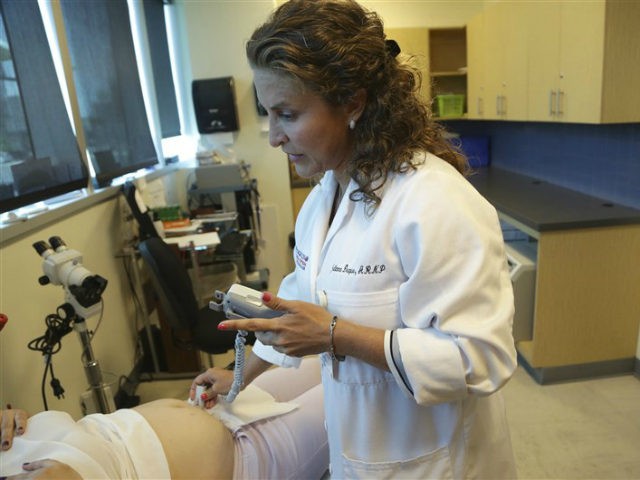Connecticut Democrats are intent on attempting to regulate faith-based pregnancy centers with another bill that essentially accuses the pro-life centers of trying to deceive women about the services they provide.
The legislature’s public health committee is holding a public hearing Wednesday on SB 835, An Act Concerning Deceptive Advertising Practices of Limited Services Pregnancy Centers, a measure that pro-life leaders in the state defeated for the last three years.
According to a report at the Hartford Courant, state Sen. Heather Somers (R) a ranking member on the public health committee, said the legislation “is a bill that is providing a solution for a problem that we just don’t have.”
“I think we need to consider that with all of the other things that we are going to be doing in this session that are very lengthy and are going to take a lot of time,” she said. “No one wants to see women be deceived, but it’s just not happening in the state of Connecticut.”
“These centers have helped over 35,000 women in the state of Connecticut, and they take not one dime of money from the state,” Somers added.
Section 2 of the measure states:
No limited services pregnancy center, with the intent to perform a pregnancy-related service, shall make or disseminate before the public, or cause to be made or disseminated before the public, in any newspaper or other publication, through any advertising device, or in any other manner, including, but not limited to, through use of the Internet, any statement concerning any pregnancy-related service or the provision of any pregnancy-related service that is deceptive, whether by statement or omission, and that a limited services pregnancy center knows or reasonably should know to be deceptive.
The measure would give the Connecticut attorney general the authority to take action against centers claimed to be luring women in with deceptive ads.
“If a pregnant woman is delayed in learning her options, it can contribute to the loss of safer methods as well as the inability to terminate a pregnancy all together,” Attorney General William Tong said when the bill was raised in 2019, reported the Courant.
The report added:
Advocates of the bill say women seeking health care and reproductive advice may be tricked into thinking that’s what they’re receiving from faith-based crisis pregnancy centers. They also argue that the measure would only penalize centers that mislead women.
The pro-life Family Institute of Connecticut (FIC) stated in its analysis of the legislation there is “no substantial evidence” women seeking services at pregnancy care centers “have been or are currently being deceived by their advertising.”
“The bill offers no specifics on what language is considered deceptive yet it forces pregnancy centers to pay for ‘corrective advertising’ if their ads are deemed deceptive,” FIC asserts. “It would, in essence, put pro-abortionists in charge of deciding what is acceptable advertising for pro-lifers.”
.@CtCatholicPAC: a “clear attack on a critical service for women who are free to exercise their right to bring children into this world….[an] egregious power play by Planned Parenthood and its like-minded people, and it’s a dangerous precedent" https://t.co/ihPptir7ac
— Family Institute CT (@FICAction) January 26, 2021
In particular, the organization observes the legislation “denies the fact that pregnancy centers already make it clear they don’t perform or refer for abortions,” and presumes women in an unplanned pregnancy are not interested in alternatives to abortion.
According to the Connecticut Pregnancy Care Coalition (CPCC), abortion lobbying organization NARAL CT’s “slanderous and misleading statements” about its coalition is “part of a national campaign.”
Lisa Maloney, CPCC president, wrote to the Connecticut General Assembly the issue is that pro-life pregnancy care centers are now competitors of abortion clinics:
NARAL CT wants the public to believe that pregnancy resource centers masquerade and advertise as full service women’s health clinics, misleading women, but this is not the truth. Behind these erroneous charges lie the actual goals of the national NARAL campaign:
1) To deter women from seeking assistance at pregnancy resource centers, which do not offer abortion services or make abortion referrals.
2) To obtain the enactment of laws that infringe on the centers’ freedom to operate.
In a recent study of about 2,700 pregnancy care centers in the United States, the Charlotte Lozier Institute (CLI), the research arm of the national Susan B. Anthony (SBA) List, found the centers “provided vital services to almost two million people in 2019, at an estimated value of nearly $270 million.”
“Services are typically provided at virtually no charge,” CLI stated.
Marjorie Dannenfelser, president of SBA List, said in a statement the nation’s pregnancy care centers “are at the heart of the pro-life movement, offering a crucial lifeline directly to women and families facing unexpected pregnancies.”
She explained further:
An overwhelming majority of Americans, whether they view themselves as “pro-life” or “pro-choice,” consider pregnancy centers a valuable community resource – yet they are constantly under attack from the profit-driven abortion industry and its allies, precisely because they provide alternatives to abortion. We will always defend their right to carry out their compassionate mission as we work to protect unborn children in the law and make abortion unthinkable.
CLI President Chuck Donovan added the centers support pregnant women in their “courageous decision” to continue their pregnancy, even under difficult or crisis circumstances.
“Each year they provide a multitude of free services, including excellent medical care, for millions of women and men,” Donovan said. “Eight in 10 people involved at pregnancy centers are volunteers, an extraordinary example of igniting points of light in the darkness. Their selflessness deserves to be affirmed and celebrated.”

COMMENTS
Please let us know if you're having issues with commenting.